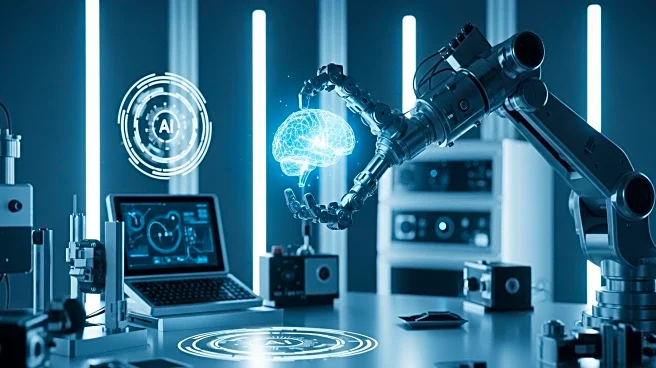What's Happening?
Coco Robotics, a startup specializing in last-mile delivery bots, has announced the establishment of a physical AI research lab led by UCLA professor Bolei Zhou. The lab aims to leverage five years of data collected by Coco's robots to advance automation and efficiency in delivery services. Professor Zhou, who has joined Coco Robotics as chief AI scientist, brings expertise in computer vision and robotics, particularly in micromobility. The collaboration seeks to enhance the autonomous capabilities of Coco's delivery robots, reducing operational costs and improving service quality. The lab will focus on using the collected data to train AI systems for real-world applications, with the goal of offering affordable and efficient delivery solutions.
Why It's Important?
The partnership between Coco Robotics and UCLA represents a significant step in the integration of AI into practical applications, particularly in urban settings. By utilizing extensive data collected from complex environments, Coco Robotics aims to refine its autonomous delivery systems, potentially transforming the logistics industry. The research conducted in the lab could lead to more efficient and cost-effective delivery solutions, benefiting businesses and consumers alike. Additionally, the collaboration highlights the importance of academic-industry partnerships in driving technological advancements and fostering innovation.
What's Next?
Coco Robotics plans to use the insights gained from the research lab to improve its automation processes and share findings with cities to address infrastructure challenges. The company aims to offer higher-quality services at lower costs, potentially expanding its market presence and driving growth in the delivery ecosystem. The ongoing research may also lead to new collaborations and technological breakthroughs, further enhancing the capabilities of Coco's delivery robots.
Beyond the Headlines
The ethical considerations of data usage and privacy in AI research are crucial as Coco Robotics advances its autonomous systems. The company's decision not to sell data to peers underscores a commitment to responsible data management and the prioritization of service improvement over commercial exploitation. This approach reflects broader industry trends towards ethical AI development and the importance of transparency in data-driven innovation.









